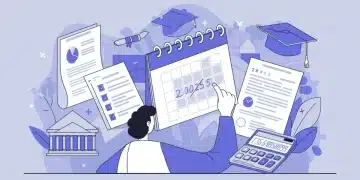Student loan collections resume June 2025: what you need to know

Student loan collections scheduled to resume in June 2025 require borrowers to understand new repayment strategies and available resources to manage their debt effectively.
Student loan collections resume June 2025, and this could significantly impact your finances. Are you prepared for the changes? Let’s dive into what this means for borrowers.
Understanding student loan collections
Understanding student loan collections is essential for every borrower. Knowing how these collections work can help you manage your repayments effectively and avoid financial pitfalls.
When loans go into collections, it means that payments have been past due for a significant amount of time. This can happen if borrowers miss multiple payments. Let’s explore how this process unfolds and what you can do about it.
What Triggers Student Loan Collections?
There are several situations that can lead to student loan collections. Understanding these can help you avoid falling behind:
- Missing multiple payment deadlines.
- Failing to set up a repayment plan after graduation.
- Not communicating with your loan servicer about financial difficulties.
It’s important to stay informed about your loan status. If you find yourself unable to make a payment, reach out to your loan servicer immediately. They can assist you in finding the best solution.
The Consequences of Collections
Once your student loans are in collections, the consequences can be severe. Your credit score may drop, making it harder to obtain future loans or credit. Additionally, collectors may begin to contact you for repayments.
Many borrowers feel overwhelmed at this stage, but there are options available. Consider discussing your situation with financial advisors or exploring loan rehabilitation programs. Remember, you are not alone in this. Many have faced similar challenges and have found ways to regain control of their finances.
Additionally, using budgeting tools can help you manage your money better, making sure you can keep up with payments and avoid going into collections again. By staying proactive, you can navigate challenges effectively.
Student loan collections are a complicated subject, but understanding the basics can empower you to take action and protect your financial future. Remember, it’s crucial to stay informed and seek help when needed.
Key changes in student loan policies

In recent years, there have been significant key changes in student loan policies that every borrower should understand. These changes can directly impact your loan repayment plans and financial future.
One important change is the eligibility criteria for income-driven repayment plans. Many borrowers can now qualify for these plans more easily, which can lower their monthly payments significantly. These policies have been designed to assist those struggling financially to manage their loans.
Loan Forgiveness Options
Another notable update includes advancements in loan forgiveness programs. More borrowers are now eligible for forgiveness after a certain number of qualifying payments. Programs such as Public Service Loan Forgiveness (PSLF) have been revamped to streamline the application process.
- Expanded eligibility for some borrowers.
- Improved tracking of eligible payments.
- Increased awareness and outreach from loan servicers.
Furthermore, another change concerns interest rates. The federal government has set fixed rates for most student loans, which can provide certainty for borrowers when planning their finances.
Repayment Flexibility
Flexibility in repayment options has also improved. Borrowers can now switch between plans more easily, allowing them to adapt their payments to changing financial situations. This means if you experience a loss of income or other financial hardship, you can request to re-evaluate your payment plan.
Understanding these key changes in student loan policies can empower borrowers to make informed decisions about their loans. Staying updated on these policies will help you navigate your financial obligations more effectively and ensure you’re taking advantage of any available assistance.
Strategies for managing loan repayments
Managing loan repayments can be challenging, but with the right strategies, you can stay on top of your payments and avoid falling into collections. Knowing how to navigate your options is key.
One effective strategy is to create a detailed budget. This budget should outline all your income and expenses to help you see where your money is going. By understanding your finances, you can allocate funds specifically for your loan repayments.
Consider Automatic Payments
Setting up automatic payments is another smart move. Many lenders offer a discount on interest rates if you agree to automatic deductions from your bank account. This not only ensures you never miss a payment but also saves you money in the long run.
- Peace of mind knowing bills are paid on time.
- Potential interest savings with discounts.
- Easier management of monthly cash flow.
Additionally, if you find yourself struggling with payments, don’t hesitate to reach out to your loan servicer. They may offer temporary relief or various repayment plans tailored to your financial situation. Understanding all your options can prevent you from feeling overwhelmed.
Make Extra Payments When Possible
Consider making extra payments when you can. Even small additional amounts can reduce your principal balance, leading to lower interest over time. This is especially true for federal student loans, where you can specify if you want extra payments to go towards the principal.
Staying informed about your loans is crucial. Regularly reviewing your loan statements helps you track your balance and payment history. This awareness can keep you motivated and focused on your repayment goals. By utilizing these strategies for managing loan repayments, you empower yourself to take control of your financial future.
Resources for student loan borrowers

For borrowers dealing with student loans, understanding available resources for student loan borrowers is crucial. Luckily, there are many tools and organizations aimed at helping you manage your debt effectively.
One essential resource is the U.S. Department of Education’s Federal Student Aid website. This site offers comprehensive information about loan repayment plans, forgiveness options, and how to contact your loan servicer. Being informed about your options can make a significant difference.
Nonprofit Organizations
Another valuable source of assistance is nonprofit organizations that specialize in student loan counseling. These organizations can provide guidance on managing your loans and help you create personalized repayment strategies. They often offer:
- Free financial counseling services.
- Workshops on budgeting and debt management.
- Support in applying for forgiveness programs.
Additionally, consider using online tools designed to help you track and manage your loans. Many websites offer calculators to estimate your payments and provide insights on how to pay off debt faster.
Loan Forgiveness Programs
Being aware of loan forgiveness programs is also essential. Programs such as Public Service Loan Forgiveness (PSLF) can forgive remaining balances after meeting specific criteria. Understanding these programs can save you money and lessen your financial burden.
Lastly, participating in financial literacy courses can enhance your understanding of managing student loans. These courses often cover budgeting, saving, and planning for the future. By utilizing these resources for student loan borrowers, you can take proactive steps towards better managing your student debt.
In conclusion, managing student loans can be challenging, but with the right strategies and resources, you can take control of your financial future. Understanding the available options, such as different repayment plans and loan forgiveness programs, is essential. Remember to utilize available resources to help you navigate your student loan journey effectively. By staying informed and proactive, you can reduce stress and work towards becoming debt-free.
FAQ – Frequently Asked Questions about Student Loan Management
What should I do if I miss a student loan payment?
If you miss a payment, contact your loan servicer immediately. They can help you understand your options and avoid going into collections.
Are there specific resources available for student loan borrowers?
Yes, resources include the U.S. Department of Education’s website, nonprofit organizations offering financial counseling, and loan forgiveness programs.
How can I lower my monthly student loan payments?
Consider applying for an income-driven repayment plan, which can lower your payments based on your income and family size.
What is loan forgiveness, and how can I qualify?
Loan forgiveness means you may not have to repay the full amount of your loan after meeting specific criteria, such as working in public service for a certain number of years.





